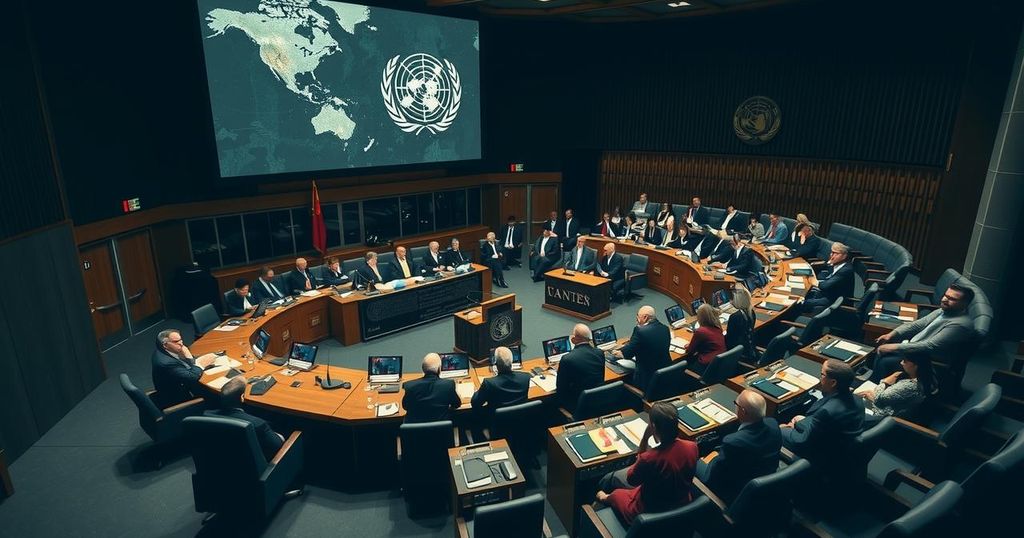The International Court of Justice will hold its first hearings next week to discuss legal obligations of countries regarding environmental protection from greenhouse gases. With over 100 nations participating, the outcome seeks to create a legal foundation for climate action. Activists are hopeful for impactful guidance, while critics are concerned about the limited immediate effects of the advisory opinion.
Next week, the International Court of Justice (ICJ) will convene for unprecedented hearings focused on establishing a legal framework that mandates states to safeguard the environment against harmful greenhouse gas emissions and delineates the repercussions for failing to comply with such obligations. This significant gathering will witness representatives from over 100 countries and organizations providing their insights, marking a historic participation level. Environmental advocates are hopeful that the court’s advisory opinion will have profound implications in the ongoing battle against climate change.
The hearings, set against the backdrop of the recent COP29 summit which revealed a contentious climate deal, are crucial. While wealthier nations pledged $300 billion annually in climate financing by 2035, critics consider this figure woefully inadequate. Additionally, the deal notably omitted a commitment to phase out fossil fuels, a critical concern for many nations vulnerable to climate impact.
In a landmark resolution passed by the UN General Assembly last year, two pivotal questions were referred to the ICJ for clarification: first, what are the obligations of states under international law regarding the protection of the climate? Second, what legal consequences arise from actions or inactions that significantly harm the climate and the environment? This inquiry particularly pertains to the responsibilities of developed nations towards more vulnerable states, especially those threatened by rising sea levels and extreme weather events.
“Climate change for us is not a distant threat,” emphasized Vishal Prasad of the Pacific Islands Students Fighting Climate Change group. He articulated that their islands are undergoing drastic changes, underscoring the urgent need for legal clarity in climate responsibilities. Prasad’s organization initiated the campaign leading to this advisory request, which received unanimous support from the General Assembly last year.
Legal experts, such as Joie Chowdhury from the Center for International Environmental Law, foresee that the ICJ will not deliver definitive answers but will create a starting point for future legal discussions on climate change, helping to shape national and international climate litigation. Approximately 98 countries and 12 organizations, including some of the world’s largest polluters, will participate in this two-week hearing. An opening statement will be presented by representatives from vulnerable states like Vanuatu and member nations of the Melanesian Spearhead Group.
The upcoming hearings at the International Court of Justice signify a pivotal moment in international climate law, as they aim to ascertain the legal responsibilities of nations concerning greenhouse gas emissions. The initiative follows increasing global concern over insufficient climate action and the detrimental effects of climate change on vulnerable populations, particularly in low-lying island nations. The context is further complicated by recent negotiations at COP29, where developed nations’ pledges were met with criticism for their inadequacy in addressing urgent climate issues. Furthermore, this advisory opinion from the ICJ is anticipated to provide crucial guidance for future litigation as states grapple with their environmental obligations under international law.
In conclusion, the ICJ’s unprecedented hearings on climate change will critically examine state obligations under international law concerning greenhouse gas emissions and outline the potential legal consequences for non-compliance. These proceedings reflect the urgent need for a cohesive legal strategy to combat climate change, particularly for vulnerable nations facing immediate threats. As various stakeholders converge to contribute their insights, the outcome could significantly influence global climate policy and enforcement mechanisms. Ultimately, the expected advisory opinion aims to clarify legal frameworks while advocating for the protection of communities and environments at risk due to climate change.
Original Source: globalnation.inquirer.net






